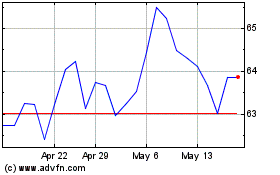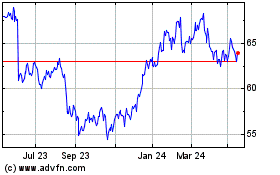Hong Kong Stocks Flirt With Bull Market
21 July 2016 - 3:10PM
Dow Jones News
Hong Kong stocks were close to entering a bull market Thursday,
in yet another sign of the building confidence among global
investors that central banks will soon roll out measures to boost
economies.
The Hang Seng Index was last up 0.6% at 22003.65, having risen
in six of the past seven trading sessions. Property and financial
stocks propelled the benchmark's recent gains, with those sectors
up 2.5% and 1.5%, respectively, this week.
Hong Kong's equity gains in the morning tilt the Hang Seng Index
into positive returns for the year to date, and it is up more than
20% from its low in mid-February. If it keeps the gains to the
close, it will enter bull market territory.
Elsewhere Thursday, the Nikkei Stock Average was up 1.3%,
Australia's S&P/ASX 200 was up 0.6% and South Korea's Kospi was
roughly flat.
The rally in Asia tracks move by U.S. stocks to record highs, as
investors look to central banks from Europe to Japan to enact
coordinated easing following the U.K.'s vote to leave the European
Union. Corporate earnings and strong economic data out of the U.S.
also buoy sentiment in Asia.
"Central bank expectations are the major driver, with good
earnings from the bellwethers keeping the momentum going,"" said
Bill Bowler, equities trader at Hong Kong-based brokerage Forsyth
Barr Asia Ltd. Overnight, gains in Microsoft Corp. helped the Dow
to its seventh consecutive record, with the firm reporting
better-than-expected earnings after the close.
In Hong Kong, some of the buying has come from Chinese mainland
investors, who have increasingly bought blue-chip stocks through a
trading link between Shanghai and Hong Kong. Usage of the
southbound quota for that link has risen to a high of 81%.
On Thursday, New World Development Co. Ltd. jumped 1.5%, Cheung
Kong Property Holdings Ltd. rallied 1.6% and Sun Hung Kai
Properties was up 1.4%. Investors were betting that the city's
property market bottomed in March. Home prices have risen 2% since
then, according to a report yesterday by Citi.
Shares of HSBC Holdings PLC were up 0.6%, despite news overnight
that a foreign-exchange executive at the firm was arrested for
allegedly front-running a $3.5 billion currency trade for a client.
The firm's stock is off 18.34% year-to-date, one of the worst
performers on the Hang Seng.
Investors are watching Bank Indonesia, which may be tempted to
cut interest rates on Thursday to support weak domestic demand,
according to eight of 15 economists polled by The Wall Street
Journal. Indonesia's JSX benchmark was last up 0.3%.
But the greatest hope for stimulus in the region remains the
Bank of Japan, scheduled to meet on July 28-29. Local media
reported today that a government fiscal stimulus package could
amount to 20 trillion yen ($187 billion).
The Japanese yen traded as weak as 107.24 yen to one U.S. dollar
Thursday. A weaker local currency supports the competitiveness of
Japanese exporters.
Prices of Brent crude oil was last up 0.5% at $47.38 a
barrel.
Kenan Machado and Kosaku Narioka contributed to this
article.
Write to Chao Deng at Chao.Deng@wsj.com
(END) Dow Jones Newswires
July 21, 2016 00:55 ET (04:55 GMT)
Copyright (c) 2016 Dow Jones & Company, Inc.
ASX (ASX:ASX)
Historical Stock Chart
From Dec 2024 to Jan 2025

ASX (ASX:ASX)
Historical Stock Chart
From Jan 2024 to Jan 2025
